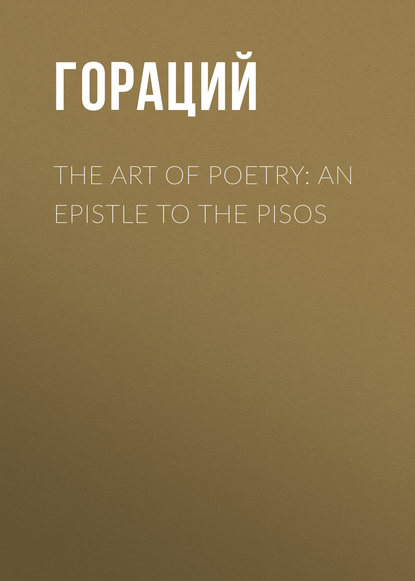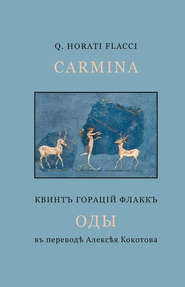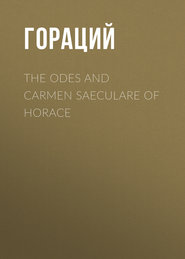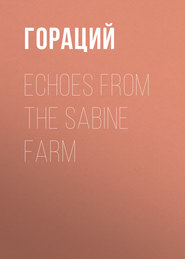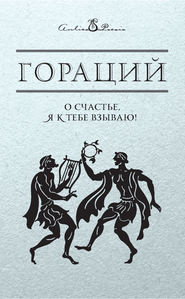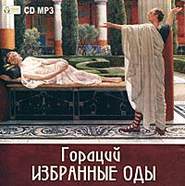По всем вопросам обращайтесь на: info@litportal.ru
(©) 2003-2024.
✖
The Art of Poetry: an Epistle to the Pisos
Настройки чтения
Размер шрифта
Высота строк
Поля
Pictures the dolphin, and the boar in floods!
Thus ev'n the fear of faults to faults betrays,
Unless a master-hand conduct the lays.
Aemilium circa ludum faber imus et ungues
Exprimet, et molles imitabitur aere capillos,
Infelix operis summâ, quia ponere totum
Nesciet: hunc ego me, si quid componere curem,
Non magis esse velim, quàm pravo vivere naso,
Spectandum nigris oculis, nigroque capillo.
* * * * *
Sumite materiam vostris, qui scribitis, aequam
Viribus: et versate diu, quid ferre recusent
Quid valeant humeri. Cui lecta potenter erit res,
Nec facundia deferet hunc, nec lucidus ordo.
* * * * *
Ordinis haec virtus erit et venus, aut ego fallor,
Ut jam nunc dicat, jam nunc debentia dici
Pleraque differat, et praesens in tempus omittat.
An under workman, of th' Aemilian class,
Shall mould the nails, and trace the hair in brass,
Bungling at last; because his narrow soul
Wants room to comprehend a perfect whole.
To be this man, would I a work compose,
No more I'd wish, than for a horrid nose,
With hair as black as jet, and eyes as black as sloes.
* * * * *
Select, all ye who write, a subject fit,
A subject, not too mighty for your wit!
And ere you lay your shoulders to the wheel,
Weigh well their strength, and all their weakness feel!
He, who his subject happily can chuse,
Wins to his favour the benignant Muse;
The aid of eloquence he ne'er shall lack,
And order shall dispose and clear his track.
Order, I trust, may boast, nor boast in vain,
These Virtues and these Graces in her train.
What on the instant should be said, to say;
Things, best reserv'd at present, to delay;
Hoc amet, hoc spernat, promissi carminis auctor.
* * * * *
In verbis etiam tenuis cautusque ferendis,
Dixeris egregié, notum si callida verbum
Reddiderit junctura novum: si forté necesse est
Indiciis monstrare recentibus abdita rerum;
Fingere cinctutis non exaudita Cethegis
Continget: dabiturque licentia sumpta pudenter.
Et nova factaque nuper habebunt verba fidem, si
Graeco fonte cadant, parcé detorta. Quid autem?
Caecilio, Plautoque dabit Romanus, ademptum
Virgilio, Varioque? ego cur acquirere pauca
Guiding the bard, thro' his continu'd verse,
What to reject, and when; and what rehearse.
On the old stock of words our fathers knew,
Frugal and cautious of engrafting new,
Happy your art, if by a cunning phrase
To a new meaning a known word you raise:
If 'tis your lot to tell, at some chance time,
"Things unattempted yet in prose or rhime,"
Where you are driv'n perforce to many a word
Which the strait-lac'd Cethegi never heard,
Take, but with coyness take, the licence wanted,
And such a licence shall be freely granted:
New, or but recent, words shall have their course,
If drawn discreetly from the Graecian source.
Shall Rome, Caecilius, Plautus, fix your claim,
And not to Virgil, Varius, grant the same?
Or if myself should some new words attain,
Shall I be grudg'd the little wealth I gain?
Si possum, invideor; cùm lingua Catonis et Ennî
Sermonem patrium ditaverit, et nova rerum
Nomina protulerit? Licuit, semperque licebit
Signatum praesente notâ procudere nomen.
Ut silvae foliis pronos mutantur in annos;
Prima cadunt: ita verborum vetus interit aetas,
Et juvenum ritu florent modò nata vigentque.
Debemur morti nos, nostraque; sive receptus
Terrâ Neptunus, classes Aquilonibus arcet,
Regis opus; sterilisve diu palus, aptaque remis,
Vicinas urbes alit, et grave sentit aratrum:
Seu cursum mutavit iniquum frugibus amnis,
Doctus iter melius: mortalia facta peribunt,
Tho' Cato, Ennius, in the days of yore,
Enrich'd our tongue with many thousands more,
And gave to objects names unknown before?
No! it ne'er was, ne'er shall be, deem'd a crime,
To stamp on words the coinage of the time.
As woods endure a constant change of leaves,
Our language too a change of words receives:
Year after year drop off the ancient race,
While young ones bud and flourish in their place.
Thus ev'n the fear of faults to faults betrays,
Unless a master-hand conduct the lays.
Aemilium circa ludum faber imus et ungues
Exprimet, et molles imitabitur aere capillos,
Infelix operis summâ, quia ponere totum
Nesciet: hunc ego me, si quid componere curem,
Non magis esse velim, quàm pravo vivere naso,
Spectandum nigris oculis, nigroque capillo.
* * * * *
Sumite materiam vostris, qui scribitis, aequam
Viribus: et versate diu, quid ferre recusent
Quid valeant humeri. Cui lecta potenter erit res,
Nec facundia deferet hunc, nec lucidus ordo.
* * * * *
Ordinis haec virtus erit et venus, aut ego fallor,
Ut jam nunc dicat, jam nunc debentia dici
Pleraque differat, et praesens in tempus omittat.
An under workman, of th' Aemilian class,
Shall mould the nails, and trace the hair in brass,
Bungling at last; because his narrow soul
Wants room to comprehend a perfect whole.
To be this man, would I a work compose,
No more I'd wish, than for a horrid nose,
With hair as black as jet, and eyes as black as sloes.
* * * * *
Select, all ye who write, a subject fit,
A subject, not too mighty for your wit!
And ere you lay your shoulders to the wheel,
Weigh well their strength, and all their weakness feel!
He, who his subject happily can chuse,
Wins to his favour the benignant Muse;
The aid of eloquence he ne'er shall lack,
And order shall dispose and clear his track.
Order, I trust, may boast, nor boast in vain,
These Virtues and these Graces in her train.
What on the instant should be said, to say;
Things, best reserv'd at present, to delay;
Hoc amet, hoc spernat, promissi carminis auctor.
* * * * *
In verbis etiam tenuis cautusque ferendis,
Dixeris egregié, notum si callida verbum
Reddiderit junctura novum: si forté necesse est
Indiciis monstrare recentibus abdita rerum;
Fingere cinctutis non exaudita Cethegis
Continget: dabiturque licentia sumpta pudenter.
Et nova factaque nuper habebunt verba fidem, si
Graeco fonte cadant, parcé detorta. Quid autem?
Caecilio, Plautoque dabit Romanus, ademptum
Virgilio, Varioque? ego cur acquirere pauca
Guiding the bard, thro' his continu'd verse,
What to reject, and when; and what rehearse.
On the old stock of words our fathers knew,
Frugal and cautious of engrafting new,
Happy your art, if by a cunning phrase
To a new meaning a known word you raise:
If 'tis your lot to tell, at some chance time,
"Things unattempted yet in prose or rhime,"
Where you are driv'n perforce to many a word
Which the strait-lac'd Cethegi never heard,
Take, but with coyness take, the licence wanted,
And such a licence shall be freely granted:
New, or but recent, words shall have their course,
If drawn discreetly from the Graecian source.
Shall Rome, Caecilius, Plautus, fix your claim,
And not to Virgil, Varius, grant the same?
Or if myself should some new words attain,
Shall I be grudg'd the little wealth I gain?
Si possum, invideor; cùm lingua Catonis et Ennî
Sermonem patrium ditaverit, et nova rerum
Nomina protulerit? Licuit, semperque licebit
Signatum praesente notâ procudere nomen.
Ut silvae foliis pronos mutantur in annos;
Prima cadunt: ita verborum vetus interit aetas,
Et juvenum ritu florent modò nata vigentque.
Debemur morti nos, nostraque; sive receptus
Terrâ Neptunus, classes Aquilonibus arcet,
Regis opus; sterilisve diu palus, aptaque remis,
Vicinas urbes alit, et grave sentit aratrum:
Seu cursum mutavit iniquum frugibus amnis,
Doctus iter melius: mortalia facta peribunt,
Tho' Cato, Ennius, in the days of yore,
Enrich'd our tongue with many thousands more,
And gave to objects names unknown before?
No! it ne'er was, ne'er shall be, deem'd a crime,
To stamp on words the coinage of the time.
As woods endure a constant change of leaves,
Our language too a change of words receives:
Year after year drop off the ancient race,
While young ones bud and flourish in their place.
Другие электронные книги автора Квинт Гораций Флакк
Другие аудиокниги автора Квинт Гораций Флакк
Избранные оды




 4.67
4.67





